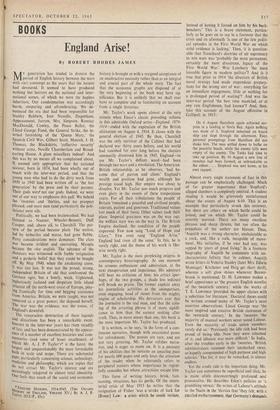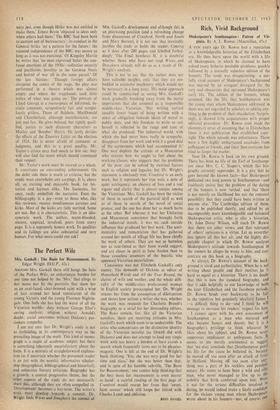BOOKS England Arise!
By ROBERT RHODES JAMES
MY generation has tended to dismiss the period of English history between the wars with curt contempt as the years that the locusts had devoured. It seemed to have produced nothing but horrors on the national and inter- national scenes, of which we were the hapless inheritors. Our condemnation was accordingly harsh, unsparing and all-embracing. We de- nounced the era that had been responsible for Stanley Baldwin, Ivor Novello, Dagenham, Appeasement, Jarrow, Mrs. Simpson, Ramsay MacDonald, Cowley, the Peace Ballot, the Lloyd George Fund, the General Strike, the in- ternal furnishing of the 'Queen Mary,' the Spanish Civil War, Gilbert Scott, Munich, J. H. Thomas, the Blackshirts, 'collective security' without arms, Neville Chamberlain and Broad- casting House. A glum miscellany indeed! And this was by no means all we complained about. It seemed only appropriate that the national saviour, born in 1874, had been wholly out of touch' with the inter-war period, and that the young men who had to do the dirty work from 1939 to 1945 had been written off as 'the lost generation' by the press and by their parents. Their gods were' not our gods. Indeed, we went out of our way to emphasise this gulf. We beheld the 'twenties and 'thirties, and no prospect Pleased, and most men (and particularly the poli- ticians) were vile.
Politically, we had been brainwashed. We had listened to Namier, Wheeler-Bennett, Duff Cooper, and, above all, to Churchill. The pat- tern of the period became plain. The nation, led by imbeciles and worse, had gone flabby. Party considerations were dominant. The class war became strident and enervating. Myopia became the vice anglais. The advance of the dictators was witnessed with feeble resignation and a pathetic belief that they could be bought off. By May 1940, when the awakening came, It was too late. It was not the proud, strong, independent Britain of old that confronted the German ogre, but a lonely, weak, frightened, ingloriously isolated and desperate little island situated off the north-west coast of Europe, play- ing frantically for time and begging assistance from America. Britain, we were taught, was not removed as a great power; she deposed herself. The war was the evidence, not the cause, of England's downfall.
The remorseless destruction of these legends and distortions has been a remarkable event. Interest in the inter-war 'years has risen steadily 01 late, and has been demonstrated by the appear- ance of a number of excellent histories and com- mentaries (and some of lesser excellence), of Which Mr. A. J. P. Taylor's* is the latest, the largest and unquestionably the most formidable both in scale and scope. There are substantial gaps, particularly concerning science, technology, Medicine and philosophy, which are topics that do not attract Mr. Taylor's interest and are _accordingly relegated to almost total obscurity. une feels that much of the social and economic ENGLISH HISTORY, 1914-1945. (Tun OXFORD HISTORY OF ENGLAND, VOLUME XV.) By A. J. P. Taylor. (0.U.P., 45s.) history is brought in with a resigned acceptance of an unattractive necessity rather than as an integral and crucial part of the whole story. The fact that the economic graphs are disposed of at the very beginning of the book may have sig- nificance. But it is unlikely that we shall ever have so complete and so fascinating an account from a single historian.
Mr. Taylor's work opens almost at the very minute when Ensor's classic preceding volume in this admirable Oxford series—England, 1870- 1914—ended with the expiration of the British ultimatum on August 4, 1914. It closes with the general election of 1945. By then, Churchill was the only survivor of the Cabinet that had declared war thirty years before, and his world had vanished for ever long before the electors summarily dismissed him in 1945. England—to use Mr. Taylor's defiant word—had been through two wars and a revolution. The American- British relationship, as he observes, 'had be- come that of patron and client.' England's wealth and position had gone, although her prestige stood high. Her empire was about to dissolve. Yet Mr. Taylor sees much progress and even glory in the events of these tempestuous years. For all their tribulations the people of Britain 'remained a peaceful and civilised people, tolerant, patient and generous. Traditional values lost much of their force. Other values took their place. Imperial greatness was on the way out; the welfare state was on the way in. The British Empire, declined; the condition of the people improved. Few now sang "Land of Hope and Glory." Few even sang "England Arise." England had risen all the same.' In this, he is surely right, and the theme of his work is like- wise surely right.
Mr. Taylor is the most perplexing enigma in contemporary historiography. At one moment he arouses enthusiasm and admiration, at the next exasperation and impatience. His admirers will hear no criticism of him; his critics (per- haps, of the two groups, a shade less tedious) will brook no praise. The former explain away his journalistic activities as the unimportant, even engaging, head of steam from the mighty engine of scholarship. His detractors aver that the journalist is the real man, and that the coin- ing of the arresting phrase is of more signifi- cance to him than the earnest seeking after truth. Thus, in more senses than one, this book is the most important Mr. Taylor has produced.
It is written, as he says, 'in the form of a con- tinuous narrative, though with occasional pause for refreshment.' The pauses are rare, and are not very arresting. Mr. Taylor relishes narra- tive, and is eager to move on. It is a measure of his abilities that he sustains an amazing pace for nearly 600 pages and only loses the attention , of the reader when he reluctantly refers to peripheral matters whose importance he regret- fully concedes but whose attractions escape him.
This form of writing history, brisk, fast- moving, vivacious, has its perils. Of the minis- terial crisis of May 1915 he writes that the resignation of Fisher 'was a stroke of luck for [Banat.] Law: a crisis which he could initiate, instead of having it forced on him by his back- benchers.' This is a brave statement, particu- larly as he goes on to say in a footnote that the crisis and its aftermath 'is one of the few politi- cal episodes in the First World War on which solid evidence is lacking.' Then, it is question- able that Trenchard's doctrine of air supremacy to win wars was 'probably the most permanent, certainly the most disastrous, legacy of the First World War.' Was Lansbury 'the most loveable figure in modern politics'? And is it true that prior to 1914 'the directors of British naval strategy had made stupendous prepara- tions for the wrong sort of war: everything for an immediate engagement, little or nothing for
a prolonged period of waiting'? And was the inter-war period 'the best time mankind, or at any rate Englishmen, had known'? And, then, take this account of the August offensive in Gallipoli in 1915: On 6 August Hamilton again achieved sur- prise in a landing at Suvla Bay. Again nothing was made of it. Stopford remained on board ship and slept through the afternoon. Even c, personal promptings from Hamilton did not shake him. The men settled down to bathe on the peaceful beach, while the enemy hills were empty of the enemy. The Turks had time to take up position. By 10 August a new line of trenches had been formed, as unbreakable as the others . . . Stopford was sent home, at his own request.
Almost every single statement of fact in this passage can be emphatically challenged. Much of 'far greater importance than Stopford's alleged slumbers is completely omitted. A student reading it would be grievously misinformed about the events of August 6-10. This is an example that particularly struck this reviewer, but there are others on which battle could be joined, and on which Mr. Taylor could be severely worsted. There are many excellent phrases and sharp thrusts, but too often the prejudices of the author are blatant. Thus, 'Asquith was a strong character, unshakeable as a rock, and, like a rock, incapable of move- ment. His initiative, if he ever had any, was sapped by years of good living.' In a footnote biography of Asquith he comments with un- characteristic felinity that in cabinet, Asquith wrote letters to Venetia Stanley (later Mrs. Edwin Montagu).' Kitchener and Haig get short shrift, whereas a soft glow shines whenever Beaver- brook is mentioned. D. H. Lawrence makes a brief appearance as 'the greatest English novelist of the twentieth century,' while the works of T. E. Lawrence 'provided the upper classes with a substitute for literature.' Doctoral theses could be written around many or Mr. Taylor's most assertive observations. Lloyd George was 'the most inspired and creative British statesman of the twentieth century.' In the 'twenties 'the majority of manual workers never voted Labour. Even the majority of trade union members rarely did so.' Previously the idle rich had been proud of being idle. Now they were ashamed of it, and idleness was more difficult:' In India, after the troubles early in the 'twenties, 'British administrators resumed their unchecked sway, so happily compounded of high purpose and high salaries.' The list, it may be remarked, is almost endless.
Yet the credit side is the important thing. Mr. Taylor can sometimes be superficial and slick, he is more often disconcertingly profound and provocative. He describes Eden's policies as 'a grumbling retreat.' He writes of Labour's attitude to the Nazis in the 'thirties that `they felt, with a puzzled embarrassment, that Germany's demands were just, even though Hitler was not entitled to make them.' Ernest Bevin 'objected to ideas only when others had them: The BBC 'had been born to caution out of bureaucracy'; its conduct in the General Strike 'set a pattern for the future: the vaunted independence of the BBC was secure so long as it was not exercised.' Of Kingsley Martin he writes that 'no man expressed better the con- . fused emotions of the 1930s—collective security and paciticism, hostility to the German Nazis and hatred of war all in the same parcel.' Of the late 'thirties: 'Though foreign affairs occupied the centre of the stage, the play was performed in a theatre which was almost empty and where the stagehands took little notice of what was going on.' The portrait of Lloyd George. is a masterpiece of informed, in- cisive comment, scrupulously fair and scrupu- lously pitiless. Those of Baldwin, MacDonald and Chamberlain, although unenthusiastic, are just and fair. He gives belated, but rightly quali- fied, justice to such disparate characters as Mosley and 'Bomber' Harris. He justly derides the effects of the Zinoviev Letter on the election of 1924. He is never afraid of comment or judgment, and this is a great quality, Mr. Taylor's critics may find much to bite on; they will also find far more which should command their respect.
Mr. Taylor's work must be viewed as a whole. It constitutes an outstanding achievement. On the debit side there is much to criticise; but the credit must overwhelm any earnings. It is, above all, an exciting and enjoyable book, for his- torian and layman alike. The footnotes, for once, really embellish the narrative. Even the bibliography is a joy—even to those who, like this reviewer,-receive simultaneous caresses and kicks. Most of the kicks are fully merited. Some are not. But it is characteristic. This is an idio- syncratic work. The author, warm-blooded, sincere, sceptical, involved, peers from every page. It is a supremely honest work. Its qualities and its failings are alike substantial and very human. For what more could one ask?































 Previous page
Previous page